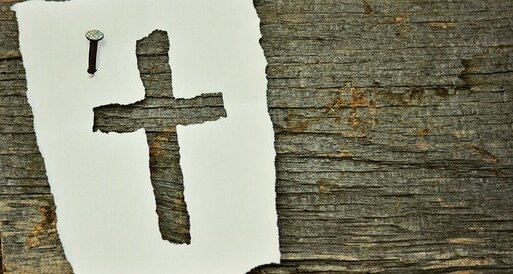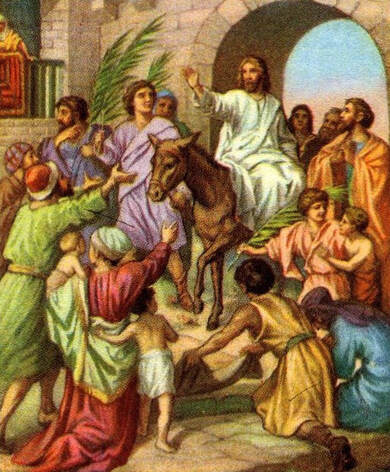 Image by congerdesign from Pixabay Image by congerdesign from Pixabay The music of the Triduum has always been among the most poignant, dramatic, and meaningful to me over my decades in music ministry. Beginning with the solemnity of Maundy Thursday, merging into the stark character of Good Friday and concluding with the glorious Alleluias of Easter Sunday, the Triduum is meant to be experienced as one uninterrupted space of worship—whether seated in the pews (watching on your pc screen!) or going about one's day. The music tells the story of Christ's Passion and Resurrection just as much as the verbal narratives we will hear this week. This Maundy Thursday, Olivier Messiaen's ode to the Eucharist, "Le Banquet Céleste" (The Celestial Banquet), opens worship on a most mystical note—a work meant to embody mystery and eternity. Cellist Heidi Mausbach offers musical responses during the Tenebrae portion of the service by J.S. Bach and a collaboration on the Gregorian Chant-based setting of "Ubi Caritas" by Jeanne Demessieux. The sublime "Choral Dorien" by Jehan Alain brings the service to a meditative close. The noon Good Friday Musical Meditation and Prayer event is a brief presentation for you to reflect upon this holy day. Settings on hymns of the Passion such as "Ah, Holy Jesus", "My Song Is Love Unknown" and "O Sacred Head, Now Wounded" will be offered and concluding with Arvo Pärt's tranquil "Pari Intervallo." This Easter Sunday morning heralds the return of the Plymouth Brass, our resident brass quintet, in works by Michael Praetorius and Sigfrid Karg-Elert. The Plymouth Ringers and Chancel Choir will also be present as we celebrate the Risen Christ in two settings of Paschal hymns. The gloriously transcendent "Acclamations" from Jean Langlais' "Suite Médiévale" closes worship with an imaginative set of variations on the two-note Gregorian Chant motif "Christus Vincit": Christ victorious. On Easter Sunday evening at 6:00, we center ourselves around the Road to Emmaus story as bread is broken and shared, revealing the Risen Christ. Guitarist Alan Skowron joins us for songs of transformation and resurrection by Gungor, U2, and Easter carols of yore.
0 Comments
 By Unknown publisher of Bible Card - http://thebiblerevival.com/clipart46.htm, Public Domain, https://commons.wikimedia.org/w/index.php?curid=9801635 By Unknown publisher of Bible Card - http://thebiblerevival.com/clipart46.htm, Public Domain, https://commons.wikimedia.org/w/index.php?curid=9801635 On this Palm Sunday morning, we hear the aural depiction of Procession: an act of stately significance yet undertaken humbly on a creature of lowly stature— a donkey. "Processional in D" by David Johnson begins morning worship with a clear call of someone significant approaching: royalty, a person of honor, a bride walking down the aisle! The aptly-titled "Recessional" by Robert Hughes encompasses the musical exclamation point a rousing postlude displays at service's end: a call to action, movement into the world with trumpets blaring! The morning's Musical Offering is a medley of Lenten hymn tunes arranged by Charles Callahan for organ and flute. "A Lenten Prelude" offers three melodies of the season: "Ah, Holy Jesus," "My Song is Love Unknown," and "Kind Maker of the World, O Hear." The setting begins with a nod to jazz before settling into a more measured stoic Baroque-like treatment. Flutist Aaron McGrew joins us. At the 6:00 p.m. service, music by Coldplay, film composer John Barry, and others inadvertently relate a more personal tale of sacrifice and redemption as we ponder the events of the coming week. Bassist Peter Strening joins myself and cantor Blair Carpenter for a worshipful hour on Zoom on the eve of Holy Week.  This Sunday is Bach's birthday...or is it? It is not as easy to answer as one would think. However, Bach scholar and Harvard professor Christoph Wolff 's answer to this question posed by Michael Barone, host of "Pipedreams," settles it for me: "Moving Bach's birthday is absolutely ridiculous. True, his life was actually 11 days longer because Protestant Germany adopted the Gregorian calendar in 1700 — but with the legal stipulation that all dates prior to Dec. 31, 1699, remain valid...Hold on to March 21, and feel good about it!" And so we will! This Sunday morning, two works inspired by the very letters of Bach's last name and one by the man himself on the occasion of turning 336. The Bach motif originated with Bach himself as a way of "signing" his name into his compositions and to provide a challenging melodic fragment to compose with. The notes are Bb (in German musical terminology, called B). A, C, and B (called H in German musical terminology.) A respectable number of works have been composed over the centuries to honor Bach in this way including by Johannes Brahms, Franz Liszt, and Arnold Schoenberg. This Sunday, the third fugue in G Minor from Robert Schumann's "Six Fugues on the Name BACH" (1845) will be offered. The Plymouth Ringers play "A Zephyr on B-A-C-H", a work I composed which began with the conspicuous question of, "What would an enchanted windchime, given the chance in a warm breeze and a penchant for Bach, sound like?" Just in case you wondered... The morning service concludes with Bach's "Fantasia in C Major, BWV 570." This uncommon selection in Bach's repertoire has the musical flexibility to be played either quietly and delicately or with bombast and gravitas. We'll go with the latter this week. At the 6:00 p.m. service, songs from the Iona Community will gather us in with a short tribute to Bach as well in Jethro Tull's "Bourée" with flutist Aaron McGrew. A Celtic Sunday all around as we honor St. Patrick's Day and the beautifully haunting Celtic folk music tradition.
At 10:00 a.m., harpist Alaina Bongers and flutist Rebecca Quillen offer a wide breadth of Celtic and folk-inspired music including the Irish ballad "Star of the County Down" and "Wondrous Love." Though first appearing in the 1854 edition of The Southern Harmony, the melody for "Wondrous Love" was taken from a popular English ballad. At 6:00 p.m., violinist Abigail Morgan joins us for a Celtic tour-de-force of jigs, reels, and the lovely waltz "SÍ Bheag SÍ Mhór" by famed 18th century Irish harp composer Turlough O'Carolan. Sláinte!  A line from Nirvana's 1992 hit "Come As You Are" could have been uttered by the Pharisees in the Gospel reading this Sunday: "Come as you are, as you were, as I want you to be...." Hypocrisy incarnate as these self-appointed arbiters of souls decide who will receive salvation in God — a demand of conformity to a false sense of righteousness. Jesus begged to differ... An intense and gradual crescendo of earnest devotion and, well, the addition of organ stops runs through the prelude, a setting of the hymn "Just As I Am" by Paul Rutz. As if pleading to the Christ ("Lamb of God, I come, I come!"), the dramatic and moody work effectively portrays the hymn text's message of humble service to the Light despite one's perceived faults and unworthy attributes. Aaron Copland composed twelve settings of poems by Emily Dickinson published as a song cycle in 1950. This Sunday we hear the third song, "Why Do They Shut Me Out of Heaven?" The text first questions the petty reasons for not being admitted into paradise. This quickly turns into frustration and anger as heaven itself seems to simply ignore the noisy objector. One can see how some would face this injustice, even daily, in this world. The service ends with a blast from the 19th century in "Allegro maestoso," the penultimate movement from Organ Sonata No. 2 in C Minor by Felix Mendelssohn. An energetic and jubilant piece from the sonatas that were considered the finest organ works since J.S. Bach in this era. Mendelssohn like Schumann and Brahms were students of Bach and the Baroque era which sensibilities informed their compositions significantly. For Mendelssohn, his virtuosic pedal work owed much to Bach as displayed in this Sunday's postlude. Next Sunday at 6:00 p.m., folk music from the Celtic and American traditions will be offered with guitarist Bill DeMarco joining. |
Details
|


 RSS Feed
RSS Feed